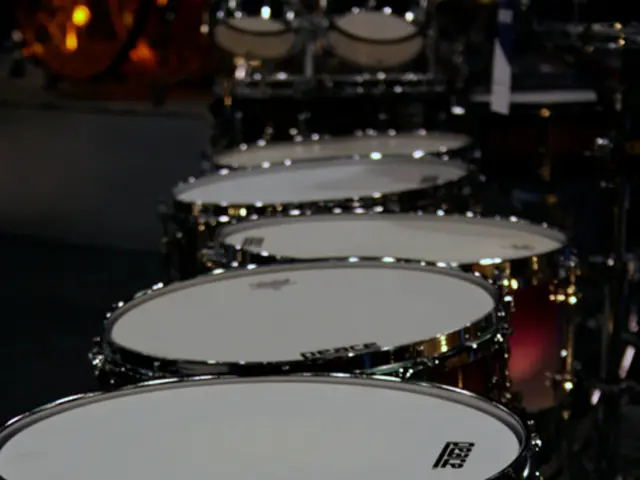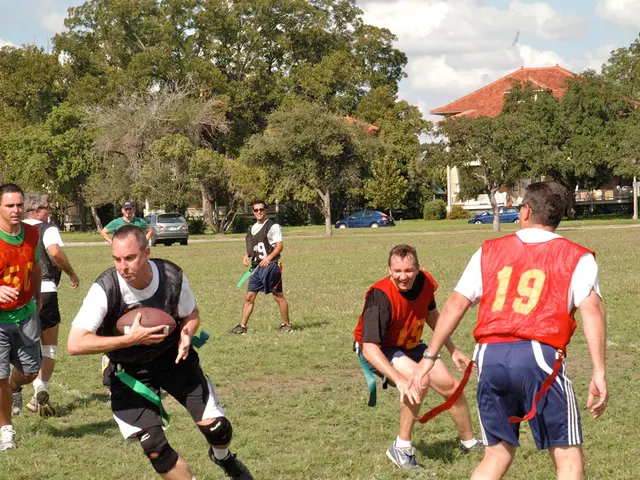From the Washington Buzz: Negotiations at a Standstill: Ukraine, US, and Russia Tangle Over Contentious Issues
Trump to decide this week on whether to continue discussions about the Ukraine conflict, according to Rubio
In the diplomatic dance, negotiations between the United States, Russia, and Ukraine over the ongoing conflict in Ukraine are hitting a snag. This week promises to be a defining one as Secretary of State Marco Rubio contemplates the future course of action, standing on the precipice of progress or retreat.
On NBC's "Meet the Press," Rubio acknowledged the importance of the upcoming days, expressing the need to make a decision about whether continued involvement is desired or if it's time to focus on more pressing matters. While displaying optimism, he admitted the negotiations are close yet not close enough. However, Rubio was tight-lipped about the specifics of the talks.
The ambiguity surrounding the timeline poses questions. Is Rubio's call to action a way to expedite discussions between Ukraine and Russia, or could the Trump administration be contemplating a walkaway?
Russian Foreign Minister Sergey Lavrov, in an interview with CBS News, didn't hint at an imminent settlement. Instead, he highlighted the need for fine-tuning certain elements of the agreement.
Tensions between the three nations have been simmering since winter, as Trump expressed perspectives favorable to Russian President Vladimir Putin while also seeking economic partnerships and mineral extraction deals with Ukraine.
In a symbolic encounter, Trump and Ukrainian President Volodymyr Zelenskyy met in the Vatican, just days after a fiery Oval Office meeting in February. Trump and his vice president accused Zelenskyy of insufficient gratitude, straining relations even further.
This month, U.S. and Ukrainian officials, including Rubio, have held talks in Paris and London, exchanging proposals and counterproposals to bridge the gap. Several contentious matters remain, including the U.S.'s demand for recognition of Crimea as Russian territory, de facto acceptance of Russian occupation in eastern Ukraine, and a ban on Ukraine joining NATO.
Despite the looming challenges, Zelenskyy expressed hope, calling the meeting with Trump a step towards a potentially historic agreement. However, differences still need to be resolved, especially when it comes to security guarantees for Ukraine, a matter the Trump administration wants Europe to handle while Zelenskyy insists is critical.
Meanwhile, Trump's special envoy, Steve Witkoff, met with Putin in Moscow, stoking speculation over the potential outcome. Trump took to social media to express his optimism, stating both sides were "very close to a deal." The negotiations, if successful, would necessitate high-level discussions between the parties to finalize the agreement.
This dance between the United States, Russia, and Ukraine continues, with diplomats working around the clock to secure a resolution that eases the humanitarian crisis and brings lasting peace. The question remains whether compromise and cooperation will prevail or if tensions will continue to simmer, fueling uncertainty.
© 2025 The New York Times Company
Enrichment Data:
Key Points to Watch:
- Timeline for Peace Talks: The tight timeline Rubio mentioned could be an effort to pressure Ukraine and Russia into direct discussions, or the Trump administration may be considering stepping back from the negotiations if progress isn't made.
- Crimea Recognition: One of the most contentious issues is the U.S.'s demand for international recognition of Crimea as Russian territory, a position that could seriously undermine Ukraine's territorial integrity and autonomy.
- Ban on NATO Membership: Another bone of contention is the U.S.'s desire to declare that Ukraine cannot join NATO, at least during Trump's tenure. Such a declaration could be seen as a concession to Russia and would potentially strain relations with NATO members, many of whom support Ukraine.
- Security Guarantees: A critical concern for Ukraine is obtaining security guarantees from its allies. Some Western nations, such as France and the UK, are pushing for such guarantees, which should help protect Ukraine against potential Russian aggression.
- Economic Partnerships: Trump's interest in forming economic partnerships with Russia raises questions about potential conflicts of interest and the impact on the U.S.'s relationship with European allies, who have been strong supporters of Ukraine.
- As the tight deadline for peace talks comes near, the question arises if Secretary of State Marco Rubio is urging expediting discussions or contemplating American withdrawal, should progress not be made.
- A significant point of dispute in the negotiations is the United States' demand for international recognition of Crimea as Russian territory, a request that could potentially compromise Ukraine's sovereignty and autonomy.
- The ban on Ukraine joining NATO is another contested issue, with the U.S. advocating for Ukraine's inability to join the alliance during Trump's tenure, a decision that might strain relationships with NATO members who support Ukraine.
- securing essential security guarantees is a prime concern for Ukraine, with some Western countries like France and the UK advocating for such commitments to protect Ukraine from potential Russian hostility.
- The ongoing diplomatic dance between the United States, Russia, and Ukraine is further complicated by President Trump's pursuit of economic partnerships with Russia, potentially leading to conflicts of interest and strained relationships with European allies who support Ukraine.







